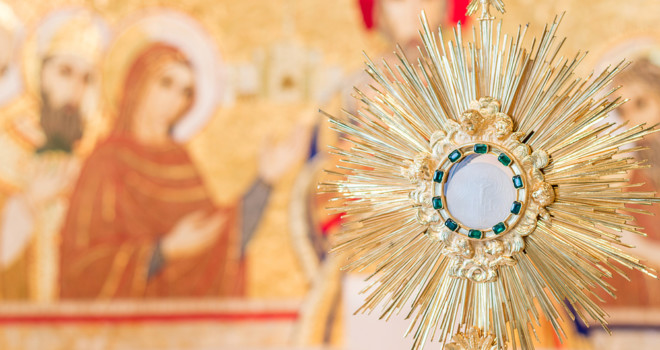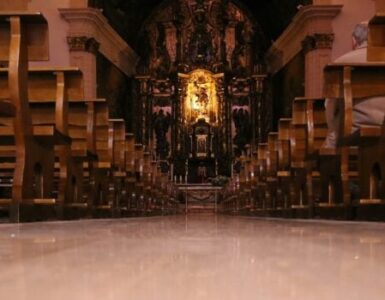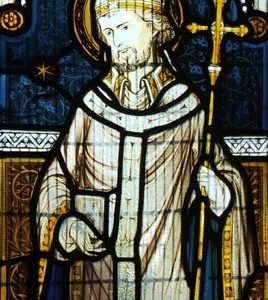St. Francis of Assisi loved France because the sacred Host was more venerated there than in any other country in the world. It is remarkable that in spite of the spread of worldliness and irreligion, the Eucharist has been more and more glorified and honored from century to century. The Eucharistic life of Christ has developed in the world as did His human life on earth. Jesus began to breathe in the seclusion of an obscure workshop and rose gradually to infinite glory. Likewise, the first Christians fed on the Bread of Life, but they did so in darkness.
But even when It is hidden, the Host gives life to the humblest church. Neither hymns nor lights are necessary to let us know that It is there. The small lamp only attests Its presence. The temples of those who deny the Real Presence are like corpses. The Lord was taken away and we do not know where they have laid Him. We can feel the gloominess of those churches, and especially of those which were formerly Catholic. Now, they resemble tombs sealed upon nothingness. A Catholic church remains always open, like the Heart forever open.
Corpus Christi…. This body of Christ was brought forth by the Blessed Virgin, and this is why the veneration paid to the Virgin Mary goes hand in hand with the cult of the Eucharist — without rivaling it and, a fortiori, without rising above it. But we do not separate the Mother from the Son.
Lourdes, where non-Catholics imagine that we accord Mary undue eminence, is no doubt that place in the world where Christ in the Eucharist is most glorified. It is the only place in the world where, under the veil of the Host, Christ mingles in the midst of so many rich people and is as closely pressed by them as He was during His mortal life. His mother prays for these bodies and these souls, and Christ cures them. The procession of the Blessed Sacrament in Lourdes starts from the Grotto to show that Jesus was given to us by the Virgin. And she who stood on Golgotha, at the foot of the Cross of the condemned Man, stands here by the side of the King of eternal glory.
On that Holy Thursday night, where did the Blessed Virgin take refuge? Did she know what was coming? Did she know that the time had come for her to suffer the blow she had been expecting for so many years? She was away from her Son because it was necessary that she be absent. Had the Mother been with Him, the Son would not have experienced complete abandonment; hardly would He have felt Judas’s betrayal. If His Mother had been there, she would have followed her Son to the Garden; she would have watched with Him, and He would not have suffered from the desertion of His friends. He would no longer have been left alone to bear the sins of the world. She would have wiped the bloody sweat from her Son’s brow. The cup would not have been drunk to the dregs.

This article is from a chapter in Holy Thursday. Click image to learn more.
The Virgin Mother does not appear in the drama of Calvary until her crucified Son, lifted up between heaven and earth, can no longer receive any help feet were nailed low enough so that she could press her lips against them? Conversely, we learn that the day after the Ascension of our Lord she was seated in the Cenacle with the Apostles. The new disciples were persevering “in the communion of the breaking of the bread and in the prayers.”
The faithful console themselves over the sorrows of the Blessed Virgin when meditating on the unfathomable joy that the Eucharist must have given her. The Virgin Mary is the only Mother who was granted the privilege of bearing her Son a second time. Who then dared to draw this parallel between the presence of Christ in the Virgin’s bosom and His presence in the heart of the faithful communicant? St. Gertrude, about to receive the Host, asked, “O Lord, what gift are you going to grant me?” And Jesus Himself answered, “The gift of my whole being with my divine nature, as formerly my Virgin Mother received it.”
The Lord’s Supper, to which the Virgin leads us in order that we may partake of her joy, is renewed every morning. The table is always set, the Bread always offered. The Christian makes his way to eternity from Communion to Communion. At each stage in the journey, Christ is waiting for him in order that he may renew his strength and take heart again.
But let us take care not to allow too much time to elapse between these stages. Long before the grace of a Communion has grown weak in us, long before the silence and peace which emanate from a Communion have been dispelled by nature and the world, we must make our way into the radiant sphere of another Communion. Let there be no opportunity between two Communions for a period of darkness in which we would run the risk of falling into snares. We have nothing to fear if Christ marks out our life. Hardly have we had time to lose Him when already we have found Him again.
A contemporary pagan poet speaks of this God with whom no excess is forbidden. How difficult it is to abuse Communion! The only requisite to sit down at that table is the nuptial garment, that is to say, the state of grace and love.
But the Eucharistic life shapes our lives even in the world. Everything matters; every idle thought, every diversion that we indulge in diminishes our ability to receive Communion. We learn from personal experience that after attending a party where we committed no other sin but to dissipate our energies, we no longer dare to approach the Holy Table. How significant this word dissipation is here. We have dissipated a treasure. Our very being, re-created by the Eucharist, has been imperceptibly diminished and corrupted by the world. Sometimes the devout soul, uneasy and dissatisfied with himself, examines his conscience and does not find anything definite to be censured. Yet he knows he has lost something.
The Eucharist confers on any life an atmosphere of its own. For those who do not live sheltered by a cloister, the struggle is circumscribed between the peaceful silence of the Eucharist and the agitation, the gossip, the laughter of life. According to the rule of St. Benedict, the monks should refrain from talking too much. They should not indulge in idle talk or in conversation which leads only to laughter; they should refrain from laughing immoderately.
This rule, which has value for religious, has value for simple laymen as well. The Eucharist obliges the faithful in the world to build for themselves an inner cathedral, a mysterious cathedral hidden in the depths of the soul. Whenever we converse at social gatherings, glittering with sophistication and vivacity, we may not realize it then, but we find out when we are alone again: we have drifted away. How much ground we have lost! We must retrace our steps; we must travel again the whole length of the road.
During our thanksgiving after Communion, every idle word we say, every frivolous agitation we consent to, interposes itself between us and Christ. We build with our own hands a wall which separates us from Him. Christ is no longer near us; His word reaches us from a greater distance. But such is His mercifulness that our slightest impulse of humility and repentance suffices to overcome each barrier.
Just as the world makes us gradually men of the world, so, too, frequent Communion refashions our souls. The Eagle hollows out in our being a nest commodious for Himself. He impresses therein the shape He loves to repose in: the shape of His own body. Thus shaped — or rather transformed — our heart will conform itself less and less to the demands of outward things. But, irresolute as he may be, will not he who has known the ardent silence of the Eucharist conclude by leaving to God the final word?
✠
This article is adapted from a chapter in Holy Thursday: The Night that Changed the World. It is available from Sophia Institute Press and anywhere you like to buy Catholic books.












